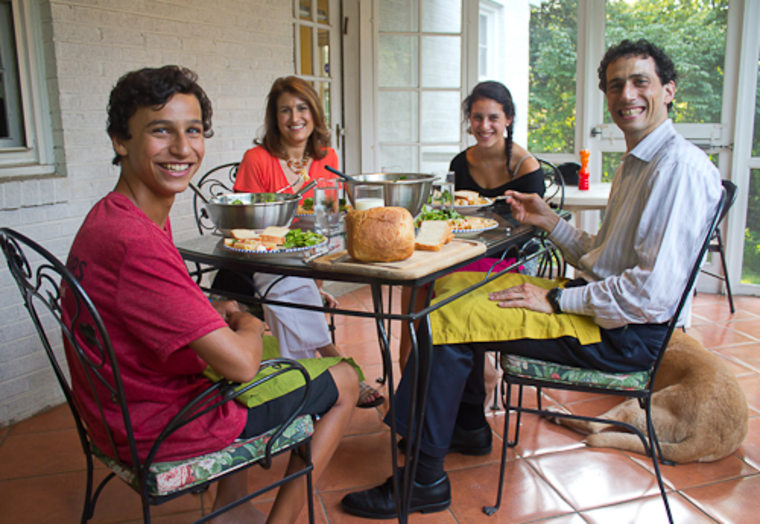Sometimes in our busy days there’s little opportunity for any connection that lasts more than a few seconds. I may send and respond to dozens of tweets and emails, “like” some posts on Facebook, text my kids, say a quick hello to the neighbors, and trade voicemails with my sister. But each of these interactions is superficial and usually lasts just a few seconds.
I can happily function at this level for much of the day, feeling productive as I race around crossing things off my list, responding and deleting, fueled by coffee and stress.
But without at least some time set aside each day for deeper interactions I believe all the frenetic activity and snippets of communication would begin to feel meaningless and disconnected. That’s one of the primary reasons that my husband and I have made it a huge priority in our family since our kids were toddlers (they are now 14 and 16) to turn off the gadgets and sit down together for dinner almost every night.

Like other families, we face challenges to coming together around the dinner table, such as evening sports or music practices, hectic Washington work schedules and food that sometimes doesn’t appeal to everyone. But because we have all come to believe so strongly in the power of family meals, we find ways to get around these obstacles. Not every night, but most nights.
It doesn’t matter all that much what we’re eating, although I do my best to make a healthy meal that we will all enjoy. The vital ingredient at family dinners is that we are sitting together, looking each other in the eye, conversing and connecting in a direct, more personal way. Without these precious hours we might not get to hear about the bowl Solomon is making in his ceramics class, or about Celia’s take on the group dynamics for her science project.
We give each other advice (it turns out teenagers have strong opinions!), take turns listening, and make each other laugh. Sometimes none of us wants to get up to face the dishes or the homework or the backlog of emails. But after 20 or 30 (or on the best nights, even 45) minutes, we do get up and get back to the busywork of life, feeling fortified in belly and soul.
I believe that it’s not just the food that nourishes us during our meals together, but it’s the face-to-face connections that are so challenging to make time for in the rest of our hectic days.
Research supports my intuition. Some of the biggest problems facing families today are childhood obesity and accompanying diseases, teen substance abuse and emotional disorders.
But recent studies have shown that when families eat dinner together more often:
- Kids maintain a healthier weight
- Families have healthier eating habits, including consuming more vegetables
- Teens are less likely to engage in risky behaviors (like drinking, drugs and sexual activity
- Kids and teens have closer relationships with their parents
All this from something as simple as eating dinners together, even a few times per week. What’s more, research shows that kids and teens actually want to eat dinner more often with their families, although less than half of them do on any given night.
That’s why, as an advocate for family dinners, I am excited and hopeful as I undertake one of the biggest initiatives I've ever attempted: The Family Dinner Challenge.
My ambitious goal is to get 10,000 families to commit to eating dinner together at least three times a week for four weeks between now and the end of September.
The hope is that families will be so inspired by the positive experience during the Challenge that they will continue making family dinners a priority in their busy lives. It may not be the solution to all that ails us, but it’s a powerful place to start.
Aviva Goldfarb is a Family Dinner Expert and founder and CEO of the family dinner planning site, the Six O’Clock Scramble.